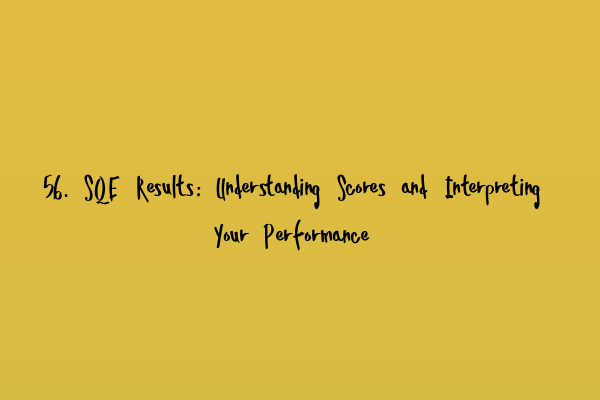56. SQE Results: Understanding Scores and Interpreting Your Performance
After months of hard work and preparation, the SQE exam is finally over. Now, the only thing left to do is wait for your results. But what do those scores really mean? And how do you interpret your performance? In this article, we will delve into the world of SQE results and guide you through the process of understanding your scores.
What is the SQE?
Before we dive into the details of interpreting SQE scores, let’s first understand what the SQE is. The Solicitors Qualifying Examination (SQE) is a new two-part assessment introduced by the Solicitors Regulation Authority (SRA) in England and Wales.
It replaces the previous qualification routes, such as the Legal Practice Course (LPC), and aims to ensure a consistent and rigorous assessment of individuals seeking to qualify as solicitors.
Understanding SQE Scores
When you receive your SQE results, you’ll see a series of numbers and letters. But what do these really mean? Let’s break it down:
- Pass: A pass indicates that you have met the minimum competency requirements for the relevant assessment. This means that you have demonstrated the necessary knowledge and skills expected of a solicitor at that level.
- Fail: A fail means that you have not met the minimum competency requirements for the assessment. However, it’s essential to remember that failing an assessment is not the end of the world. It’s an opportunity to identify your weaknesses and areas for improvement.
- Grade: In addition to a pass or fail, you may also receive a grade for the assessment. Grades are an indication of the quality of your performance. They can range from A to E, with A being the highest and E being the lowest.
- Score: Each assessment in the SQE is marked out of 180. Your score indicates the number of points you achieved on the assessment.
- Comparative Performance: Your score is also compared to the scores of other candidates who have taken the same assessment. This helps to determine your relative performance.
It’s important to note that the SRA has set minimum pass marks and grades for each assessment. To pass, you must achieve these minimum requirements.
Interpreting Your Performance
So, how do you interpret your performance based on your SQE scores? Here are a few key factors to consider:
- Pass Mark: Did you meet the minimum pass mark set by the SRA? If you did, congratulations! You’ve successfully demonstrated the required knowledge and skills. If you didn’t, don’t be disheartened. Use this as an opportunity to identify areas that need improvement and work towards strengthening your understanding.
- Grade: If you received a grade alongside your pass or fail, this can give you further insight into your performance. Grades reflect the quality of your performance and can help you gauge your level of understanding and application of knowledge.
- Comparative Performance: Your relative performance is another crucial aspect to consider. How did you fare compared to other candidates? Were you above average, below average, or on par? Understanding your comparative performance can provide you with a broader perspective on where you stand.
- Feedback: If you received feedback on your performance, carefully review it. Feedback can be invaluable in identifying specific areas for improvement. Use this information to guide your future study and preparation.
Remember, the SQE is designed to test your readiness to practice as a solicitor. It’s not uncommon to face challenges along the way. The key is to use your results as a learning opportunity and to continually strive for improvement.
Preparing for Future Assessments
Whether you passed or failed, the experience of taking the SQE is an excellent opportunity to reflect on your preparation strategies. If you passed, consider what worked well for you and replicate those methods in your future assessments.
If you did not pass, take the time to analyze your performance and identify areas where you can improve. This may involve seeking additional study resources, enrolling in preparation courses, or practicing with mock exams.
Related Articles:
- SQE 1 Practice Exam Questions
- SQE 1 Practice Mocks FLK1 FLK2
- SQE 2 Preparation Courses
- SQE 1 Preparation Courses
- SRA SQE Exam Dates
Utilize the resources available to you, such as study materials, practice exams, and expert guidance, to enhance your knowledge and skills.
Conclusion
Understanding your SQE scores and interpreting your performance is essential for your journey to becoming a qualified solicitor. Whether you passed or failed, use the results as a roadmap to guide your future study and preparation.
Stay positive and focused on your goals. With determination and continuous improvement, you can ace the SQE and embark on a successful legal career.
